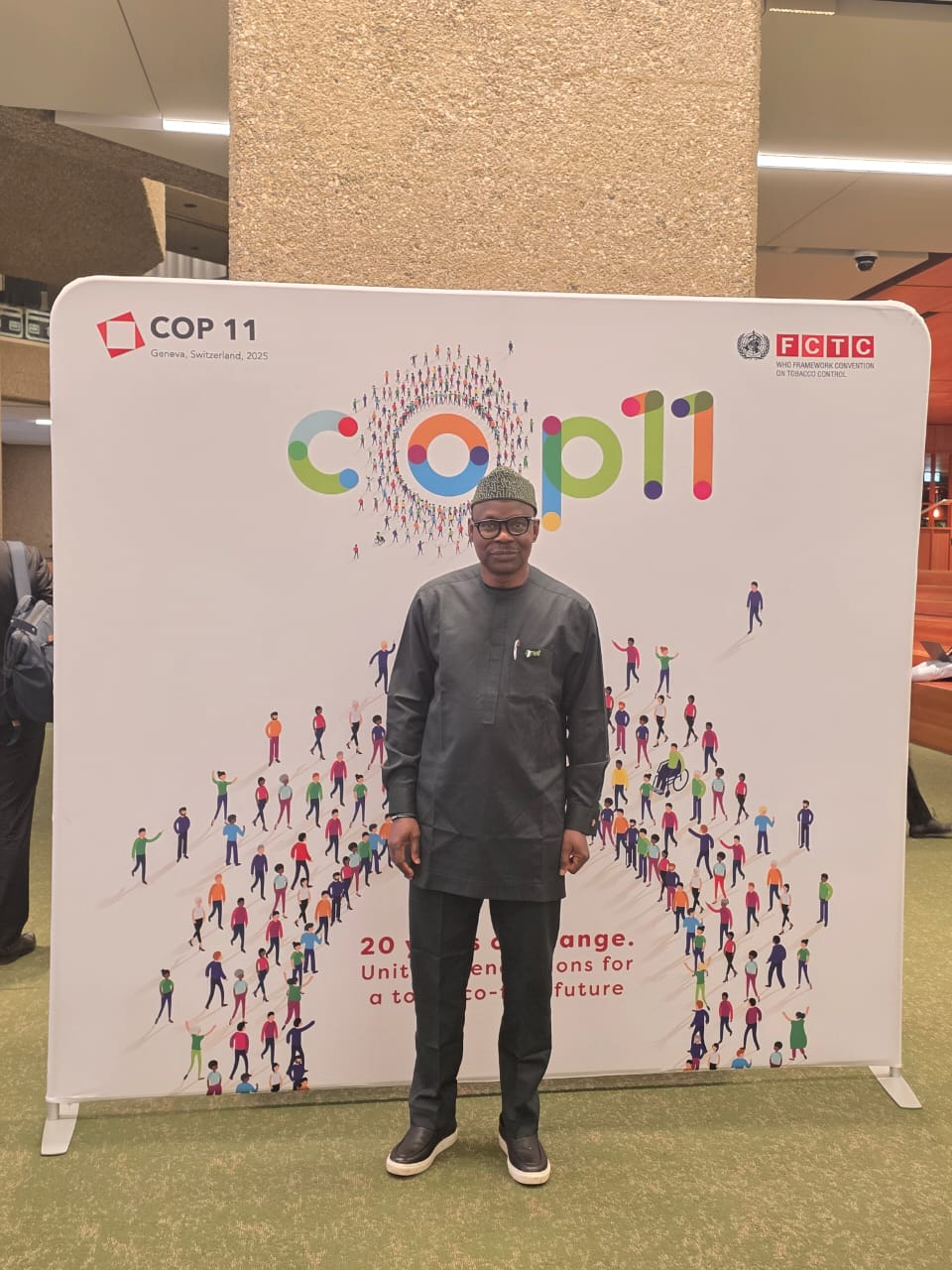OJO SAMSON AYOMIDE
Minister of State for Health and Social Welfare, Dr. Iziaq Salako, has praised Nigeria’s tobacco control efforts since 2012, saying the country had made “remarkable progress” in the fight against the deadly product.
Dr, Salako, who spoke at the ongoing 11th Session of the Conference of Parties (COP11) to the WHO Framework Convention on Tobacco Control (WHO FCTC) in Geneva, said it had resulted in a continued decline in the number of adults using tobacco in the country.
The opening session featured over 1400 delegates from across the world participating in a high-level dialogue that reviewed two decades of progress under the WHO FCTC and deliberated on accelerated action on tobacco control.
The delegates from government, international organizations and civil society including Corporate Accountability and Public Participation Africa (CAPPA) – representing 162 Parties to the WHO FCTC – began discussions on a wide range of measures to stem tobacco use, which kills more than 7 million people annually, and to protect the environment from the harms caused by tobacco production, use and waste.
Delivering Nigeria’s high-level statement at the global meeting on Monday, Dr. Salako highlighted new national data, strengthened enforcement, and bold regulatory actions that he said reinforce Nigeria’s commitment to public health and the WHO FCTC.
He said at the centre of the country’s progress was the successful completion of the second round of the Global Adult Tobacco Survey (GATS 2025), which shows a continued decline in daily tobacco use among adults compared to earlier surveys.
According to the Minister, the latest findings also reveal the powerful impact of graphic health warnings, with the percentage of smokers who considered quitting after seeing the warnings rising from 26.7 percent in 2012 to 43.3 percent in 2025, a major step forward for cessation efforts.
“Overall, from 2012 to 2025, exposure to secondhand smoke significantly declined inside homes, government buildings, restaurants, public transportation, tertiary institutions and schools,” Dr. Salako added.
Nevertheless, he emphasised that although the gains were encouraging, sustaining them would require continued vigilance and stronger enforcement at all levels of government.
The minister explained that to reinforce implementation of the National Tobacco Control Act, 2015 & Regulations, 2019, the Federal Government had rolled out multiple strategic policy documents, including the National Tobacco Control Strategic Plan of Action, 2024 – 2028, National Tobacco Control Communication Strategy, 2024 – 2028 and the National Tobacco Control Enforcement Plan, 2024 – 2028.
These frameworks, he noted, ensure a coordinated, multisectoral approach to regulation and public education.
The Minister highlighted Nigeria’s advancement of the WHO FCTC Article 19, which encourages Parties to hold the tobacco industry legally and financially accountable for actions that undermine public health, as one of the country’s most notable achievements.
“In this regard, our Federal Competition and Consumer Protection Commission (FCCPC) recently imposed a fine of 110 million US dollars on the British American Tobacco Nigeria (BATN) for multiple infringements of the National Tobacco Control Act, 2015, the National Tobacco Control Regulations, 2019, and other consumer protection laws”, Dr. Salako said.
“This represents one of the most significant applications of Article 19 globally and sends a strong message that the tobacco industry must bear responsibility for its actions.”
In addition, he spotlighted new regulations from the National Film and Video Censors Board (NFVCB) to prohibit tobacco advertising, promotion, and sponsorship (TAPS) across films, TV, music videos, and digital media, saying it was an important step in protecting young people.
“This bold step gives practical effect to Article 13 of the WHO FCTC, helping to prevent indirect advertising and the normalisation of tobacco use,” Dr. Salako added.
Despite this progress, he acknowledged ongoing challenges, including tobacco industry interference and the rise of new nicotine products. He called for stronger global collaboration, technical support, and knowledge exchange to help countries, especially developing nations, stay ahead of industry tactics.
“In conclusion, while significant progress has been made, we acknowledge that key challenges persist, including the need to strengthen enforcement especially at subnational levels; addressing the growing spread and false narrative of new and emerging tobacco and nicotine products and ensuring their strict regulation; as well as countering persistent tobacco industry interference,” Dr. Salako said.
The Minister concluded by expressing Nigeria’s gratitude to the WHO FCTC Secretariat, COP11 leadership, and participating Parties, wishing all delegates productive deliberations.
In addition to the strategic dialogue that reviewed progress on tobacco control in the 20 years since the WHO FCTC entered into force, a ministerial round table organised by the Government of Belgium addressed the pressing issue of nicotine addiction among young people and how to prevent it amid the wide availability and marketing of e-cigarettes and other novel tobacco and nicotine products.
Discussions at the round table focused on national approaches and lessons learned and the potential role of the WHO FCTC in tackling the issue.
“COP11 provides an opportunity for Parties to consider important issues including forward-looking tobacco control measures, environmental protection, liability and measures to prevent and reduce tobacco consumption, nicotine addiction and exposure to tobacco smoke,” said Andrew Black, Acting Head of the Secretariat of the WHO FCTC.
“The Secretariat of the WHO FCTC welcomes all Parties and observers to COP11 to promote international cooperation and move ahead with global action to address the global tobacco epidemic,” he added.
COP11, organized around the theme of “20 years of change – uniting generations for a tobacco-free future”, will be followed by the Fourth Meeting of the Parties to the Protocol to Eliminate Illicit Trade in Tobacco Products on 24–26 November.

